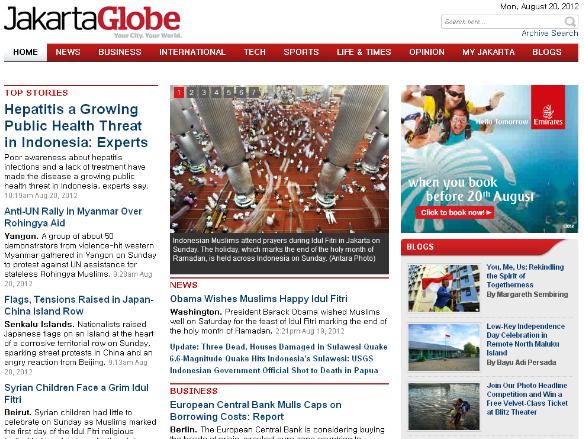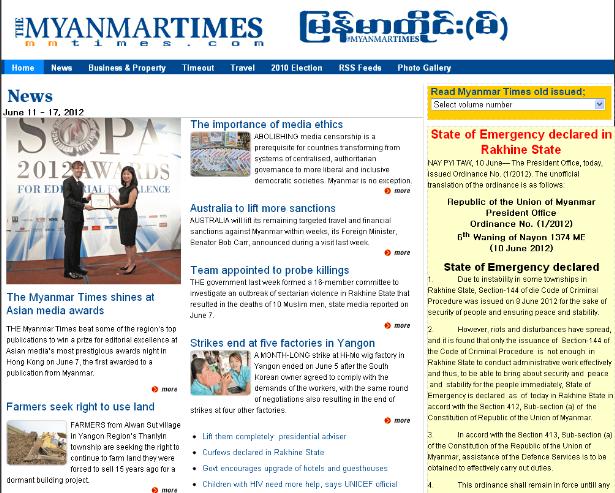Indonesia : Hepatitis a Growing Public Health Threat in Indonesia: Experts
Major News of <Jakarta Globe> : Hepatitis a Growing Public Health Threat in Indonesia: Experts

Poor awareness about hepatitis infections and a lack of treatment have made the disease a growing public health threat in Indonesia, experts say.
An estimated 25 million Indonesians have either had hepatitis B or C, but only about 20 percent of them know, said Rino Gani, the chairman of the Indonesian Liver Research Association.

Hepatitis is a viral infection with latent symptoms that can take decades to discover while it damages the liver. Impaired liver function makes it hard for the body to excrete waste or for blood to clot properly, which can be fatal in an accident or a complication from surgery.
“We don’t have hard figures for deaths caused by hepatitis, but 30 percent of people who have hepatitis B and C develop chronic heart problems, which in turn develop into cirrhosis [irreversible scarring of the liver] or liver cancer,” Gani said.
Seven types of virus can cause hepatitis, called hepatitis A to G. Hepatitis A, B, C and E are the most common, causing symptoms such as yellowing of the skin and eyes (jaundice), dark urine, extreme fatigue, and abdominal pain, according to the World Health Organization.
People can go for years, even decades, without symptoms. “The cost of treatment is high and some people think the disease is not serious enough — it can take 20 years for hepatitis B and C to cause cancer or cirrhosis,” said Gani.
In 2010 an estimated one million people in Indonesia had cancer of all types, according to the Indonesian Association of Internists.
Anti-vaccination
In 1997 the government started vaccinating children aged under 5 against hepatitis B, reaching 82 percent of the under-5 population by 2009, said Mohamad Subuh, director of the communicable diseases department of the Health Ministry. There is no vaccine available for hepatitis C.
But some groups in Indonesia have campaigned against vaccination, saying there is no proof that vaccines can protect children from diseases, and that they could even be dangerous to health.
A coalition of hard-line Islamic groups — Sharia4Indonesia — says vaccination is a Western conspiracy to weaken children in developing countries so as to create a “new world order”.
The groups organized a rally in Jakarta in 2011, staging a performance about “the dangers of vaccines”. Their leaflets quote experts such as a former director of the National Institutes of Health in the United States, James R. Shannon, as saying: “The only safe vaccine is one that is never used.”
Health Minister Nafsiah Mboi said that without vaccination, millions of lives are in danger. “I’m restless because [of] this anti-vaccine movement,” the minister said. “With immunization, we can save millions of children in Indonesia from being infected with hepatitis B and C.”
Treatment
“Our efforts have focused on prevention, but we also continue to provide better access to treatment for people with hepatitis,” said the Health Ministry’s Subuh.
The government set up a unit in the Health Ministry in 2010 to focus on hepatitis, which is preparing treatment and prevention guidelines, and conducting early-detection trials in high-risk populations, including health care workers and injecting drug users.
Hepatitis B is transmitted through contact with blood or other bodily fluids, while hepatitis C is passed from one person to another by blood-to-blood contact.
Gani said many people who have hepatitis cannot afford treatment and choose to ignore it. Hepatitis is covered under government health waivers for the poor, known as Jamkesmas, but patients either do not know about these subsidies or do not qualify for them.
Treatment for hepatitis B and C that lasts longer than six months involves injecting costly “interferon” disease-fighting proteins.
In Southeast Asia, around 100 million people are infected with hepatitis B, according to WHO.
Every year there are nearly nine million cases of hepatitis in Southeast Asia, and nearly 600,000 deaths resulting from hepatitis B and C complications.




